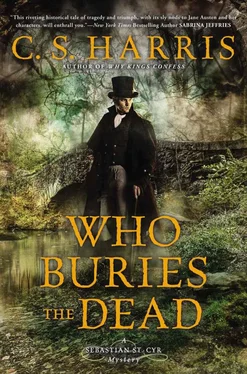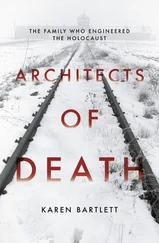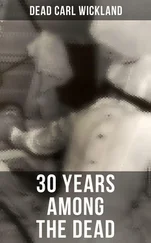C. Harris - Who Buries the Dead
Здесь есть возможность читать онлайн «C. Harris - Who Buries the Dead» весь текст электронной книги совершенно бесплатно (целиком полную версию без сокращений). В некоторых случаях можно слушать аудио, скачать через торрент в формате fb2 и присутствует краткое содержание. Год выпуска: 2015, Издательство: Penguin Publishing Group, Жанр: Исторический детектив, на английском языке. Описание произведения, (предисловие) а так же отзывы посетителей доступны на портале библиотеки ЛибКат.
- Название:Who Buries the Dead
- Автор:
- Издательство:Penguin Publishing Group
- Жанр:
- Год:2015
- ISBN:нет данных
- Рейтинг книги:4 / 5. Голосов: 1
-
Избранное:Добавить в избранное
- Отзывы:
-
Ваша оценка:
- 80
- 1
- 2
- 3
- 4
- 5
Who Buries the Dead: краткое содержание, описание и аннотация
Предлагаем к чтению аннотацию, описание, краткое содержание или предисловие (зависит от того, что написал сам автор книги «Who Buries the Dead»). Если вы не нашли необходимую информацию о книге — напишите в комментариях, мы постараемся отыскать её.
Who Buries the Dead — читать онлайн бесплатно полную книгу (весь текст) целиком
Ниже представлен текст книги, разбитый по страницам. Система сохранения места последней прочитанной страницы, позволяет с удобством читать онлайн бесплатно книгу «Who Buries the Dead», без необходимости каждый раз заново искать на чём Вы остановились. Поставьте закладку, и сможете в любой момент перейти на страницу, на которой закончили чтение.
Интервал:
Закладка:
Through all her growing-up years, she’d been determined never to marry, determined never to subject herself to the state of subordination to which England’s laws reduced any woman unwise enough to become a wife. Yet even then, she had wanted this, wanted to have a child of her own.
The babe looked up, his gaze locking with hers. She smiled at him, and he gave her in return a big, toothless grin that sent a trickle of milk running down his chin. And she felt a swift, unexpected sting of tears in her eyes, for life’s greatest joys contain within them a yawning sadness. A bittersweet awareness that even as we savor a cherished instant it is passing and will all too soon be but a memory.
A hushed murmur drew her gaze to where Devlin slept, his dark head moving restlessly against the pillow. She thought of the bullet that had come so close to taking him from her last night, and her arms tightened around the child’s small, warm body. She was not a woman who was accustomed to fear; she’d always despised those who obsessed anxiously about the future. Yet with great love comes great fear-the fear of loss. And in that moment, she knew its cold grip.
She pushed it away, both ashamed of her weakness and appalled by it.
“It’s your fault,” she whispered to the now contented babe. “You’ve done this to me.”
He smiled again, his suckling ceased, his eyes drifting closed.
She felt his small body relax against hers, heard his breathing ease into sleep. And still she sat beside the fire, hugging him close and savoring the moment.
She left Brook Street an hour later, the clatter of her horses’ hooves echoing through the still, empty streets of Mayfair as her coachman turned the team toward the City. She’d been told that to truly understand the costermongers of London, she needed to attend one of the great central markets where they purchased their stock. And so she had chosen to visit the grandest market of them all: Covent Garden.
The rising sun was just beginning to send streaks of gold and fiery orange across a pale sky when she reached the site of the city’s largest produce and flower market. Yet already the vast square before the old, temple-like church of St. Paul’s was thronged with a shouting, shoving, laughing crowd that surged around stalls piled high with everything from mud-encrusted onions and potatoes to bundles of white leaks and dark purple pickling cabbages.
She had hired a skinny, fourteen-year-old boy named Lucky Liam Gordon to serve as her guide to the wonders of the market. He had a thatch of rusty brown hair and a scattering of freckles across a pug nose, and he was the son, grandson, and great-grandson of costermongers. Hero was only just beginning to understand how closely knit-and hereditary-the trade was.
“Them’s the growers’ wagons,” said Lucky, nodding to the lines of empty covered wagons and carts pulling away from the square. “They start rollin’ in from the farms about three. I hear tell they load ’em at sunset, then leave for the City anywhere between ten and one, dependin’ on how far they’ve got to come.” He had to shout to be heard over the roar of hundreds of haggling voices, the cracking of whips and the braying of donkeys and the rattle of iron-rimmed wheels bouncing over uneven paving stones.
Hero let her gaze drift over the crush of gaily painted handbarrows, the rows of donkey carts with cracked harnesses so old they were often held together with wire or rope. The crisp morning air was heavy with the scents of charcoal smoke and dung and earthy vegetables, the pungent aromas from the herb stalls mingling with the sweet fragrance of potted laurels and myrtles and boxes. She smiled at the sight of two little boys chasing each other across cobbles smeared green with discarded leaves. Then one of the boys slipped and nearly collided with a market woman staggering beneath a heavy basket balanced on her head, before careening into Hero.
“Careful,” said Hero, keeping a strong grip on her reticule as she steadied the boy.
He threw her a cocky grin and darted off again.
The number of young children at the market, most of them boys, surprised her. Shrieks rose from a clutch of children washing at the pump, while more could be seen crowding around the fires of the coffee and tea stalls beneath the arcades, or congregating near the narrow lanes leading out of the square. Some looked no older than four or five.
“Why are they queuing?” asked Hero, watching the boys push and shove as they lined up.
“They’re ’opin’ some costermonger without a boy of ’is own will ’ire ’em for the day,” said Lucky. “Some ’as parents what send ’em ’ere to look for work. But a good many of ’em are orphans. They sleeps under the stalls at night and eats mainly specks.”
Hero brought her gaze back to his freckled face. “They eat what?”
“Specks. That’s what we call anything that’s overripe or shriveled, or that the wasps ’ave been at. They’re set aside, ye see, then sold for a quarter the price o’ the rest. Me da always says, if somethin’ won’t fetch a good price, then it must fetch a bad one.”
Hero drew her notebook and pencil from her reticule and began scribbling notes.
Officially, Covent Garden Market was devoted to the sale of fruits, vegetables, and flowers. But she could also see old iron sellers and crockery stalls scattered amidst the produce, as well as countrymen peddling wild ducks and rabbits. Rows of baskets and slippers dangled against the railings of St. Paul’s churchyard, while men and women with rusty trays slung from straps around their necks pushed their way through the crowd, hawking seedcakes and sweetmeats, razors and knives, ribbons and combs.
She was watching a lark at the bird catcher’s stall beat its wings against the bars of its cage when Lucky said, “Ye know that feller?”
“Who?” asked Hero, her gaze scanning the surging, raucous mass of humanity.
“That queer-lookin’ cove up there by the Piazza Hotel-the one with the fancy black boots. ’E’s been staring at ye ever so long. At first, I thought maybe ’e was jist puzzlin’ over what such a bang-up lady’s doin’ at Covent Garden Market. But ’e ain’t no coster, and ’e ain’t no grower neither, from the looks of ’im. So what’s ’e doin’ ’ere?”
Hero could see him now, a slope-shouldered man of medium height, lanky except for a small, slightly protuberant belly. He had a slouch hat tipped back on his head and was leaning against one of the granite pillars of the elevated north piazza, a tin cup from a nearby coffee stall cradled in one hand, the other resting negligently in his pocket.
“How do you know he’s not a costermonger?” she asked.
Lucky laughed. “I know.”
The man took a slow sip of his coffee. He wore neither the blue apron of the greengrocers nor the straw hat, smock frock, and dusty shoes of the countrymen, although his coat and breeches had never been of particularly good quality and were now worn and rumpled and greasy. Only his well-polished, high-topped boots struck a discordant note.
For one long, intense moment, the man’s gaze met hers across the square, and Hero felt her mouth go dry and an unpleasant sensation crawl across her skin. He had an oddly uneven face, with a full-lipped, crooked mouth and one eye that seemed slightly larger than the other. The sun was just cresting the rooftops of the decrepit seventeenth-century houses that lined the square and spilling golden light across the ragged, raucous crowd. The slanting sunlight caught the smoke from the charcoal fires so that, for one eerie moment, the air took on a hellish glow. Then the sun inched higher, and the illusion was broken.
“How long has he been watching us?” she asked Lucky. To her knowledge, she had never seen the man before and could not imagine who he might be.
Читать дальшеИнтервал:
Закладка:
Похожие книги на «Who Buries the Dead»
Представляем Вашему вниманию похожие книги на «Who Buries the Dead» списком для выбора. Мы отобрали схожую по названию и смыслу литературу в надежде предоставить читателям больше вариантов отыскать новые, интересные, ещё непрочитанные произведения.
Обсуждение, отзывы о книге «Who Buries the Dead» и просто собственные мнения читателей. Оставьте ваши комментарии, напишите, что Вы думаете о произведении, его смысле или главных героях. Укажите что конкретно понравилось, а что нет, и почему Вы так считаете.












